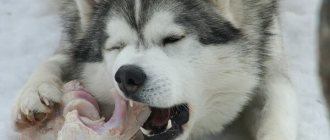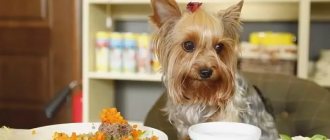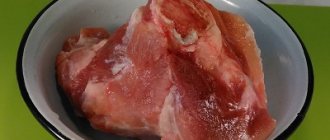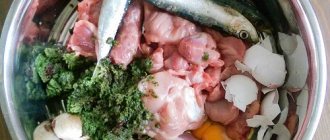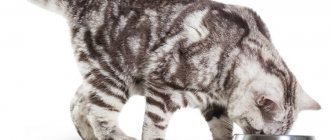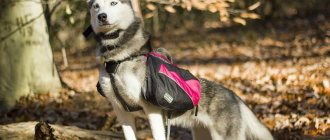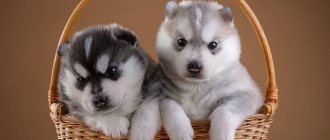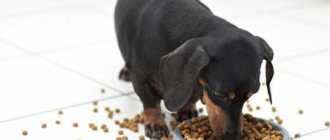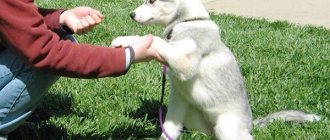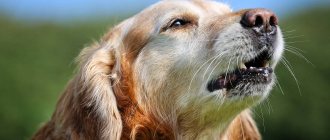Cute blue-eyed dogs, adapted to living in harsh climates, have good health. Mounts were originally intended for northern latitudes. However, Siberian Huskies also do well in families from other regions. In order for a pet to have a long and happy life, the owner needs to take care of it. It is important to devote time not only to care, training and education. You should know what to feed your husky at home - then the dog will be healthy, hardy and cheerful.
Features of the Husky breed
Husky is a native, working dog breed bred to carry small loads over long distances. The history of the breed is shrouded in fog, but there is an assumption that the ancestors of the husky are polar wolves. Modern representatives of the breed are practically not used for working purposes and are considered as show class dogs.
The characteristics of the breed make a husky a natural disaster if a puppy is purchased only for appearance or fashion. Huskies are very active, often run away, and require careful and labor-intensive care. Training a Husky requires some experience or the help of a professional.
Choosing a place and dishes for feeding a husky puppy
Husky puppies eat a lot, often and not very carefully. Representatives of the breed are very active in childhood.
When hunger becomes unbearable, the puppy drops everything and rushes to the bowl, not paying attention to obstacles. For this reason, many dogs are injured, suffer dislocations and even fractures of their front legs.
To keep your puppy safe while eating, you need to make the best choice of place and utensils.
- The eating area must be covered with a non-slip mat, preferably rubber.
- A husky puppy should be taught to eat from a stand from an early age. It is better to purchase a stand whose height can be adjusted as your pet grows.
Note! Your puppy may hiccup after eating if he swallows food too quickly. To teach your pet to eat correctly and leisurely, you can use special bowls with a structured bottom.
Pros and cons of natural food
A natural diet allows the owner to independently choose food for the dog, controlling their quality and freshness.
In addition, this type of nutrition has a number of other advantages.:
- the composition does not contain chemical dyes, flavors, flavor enhancers and preservatives, which not only do not provide any benefit to the dog, but can also adversely affect its health;
- all vitamins and macro- and microelements contained in the products are of natural origin and are better absorbed by the animal’s body;
- If your pet has an allergic reaction to one of the products, it can be replaced with an analogue without changing the entire diet.
In addition, with a natural diet, you can make the husky’s menu as varied as possible, which will minimize or completely eliminate the likelihood that the dog will get bored with food.
The disadvantages of this type of nutrition include:
- large amounts of time spent preparing food for your pet;
- inconveniences associated with feeding while traveling;
- lack of opportunity to prepare food for future use.
It is also important to understand that it is impossible to independently create a balanced diet for a husky without certain knowledge of veterinary nutrition..
What to feed a husky puppy - types of diets, advantages and disadvantages
Ask the breeder what to feed your husky puppy before moving to a new home. Stock up on the necessary products for 10-14 days and maintain the cleanliness of food that your new pet is accustomed to. This approach will reduce the puppy’s stress level after the move and speed up its adaptation.
Next, you need to decide what type of diet your pet will be kept on. There are natural, industrial and mixed types of diet, each of them has advantages and disadvantages, let's take a closer look.
Natural diet for a husky puppy
A natural diet for a husky puppy is more natural and optimal. A natural diet means feeding your dog meat porridge, which consists of meat, cereals and vegetables. During puppyhood, protein foods should predominate in the diet.
Benefits of a natural diet for a husky puppy:
- Puppies readily consume a variety of natural foods.
- You can always control the freshness and quality of the food you feed your dog.
- You can adjust your puppy's diet depending on his needs, time of year, rate of weight gain, and so on.
- Husky puppies are very playful, and large, meaty bones occupy the baby's attention for a long time.
- Feeding natural, high-quality products is cheaper than keeping them on high-quality industrial feeds. When keeping small dogs, this difference is not very noticeable, but when it comes to a large dog, you need to sensibly assess your capabilities.
Disadvantages of a natural diet for a husky puppy:
- It takes time to prepare high-quality, balanced food.
- Prepared food should not be left in a bowl, especially in hot weather.
- If the diet is not prepared correctly, there is a risk of developing vitamin deficiency or lack of minerals.
A husky puppy can be switched to a natural diet from the age of one month. If there is a need to feed a puppy from birth, it is better to use a bitch's milk substitute, and at 3-4 weeks of age the puppy can be switched to whole milk.
Ready-made food for husky puppy
Ready-made feeds vary by type and class. Economy class food is considered to be of low quality, premium and super premium class products are suitable for everyday feeding of healthy animals, holistic food is as close as possible to the natural composition. Only wet and semi-moist food of at least premium class is suitable for feeding husky puppies.
Natural food
Feeding your dog with foods of natural origin is the most correct and most popular option. But, despite the obvious benefits of natural food, properly balancing meals for your pet is quite problematic. About 70% of the daily diet should be meat products:
- offal - tripe, beef or chicken liver, kidneys, hearts;
- trimmings.
Types of meat that are suitable for huskies:
- beef;
- chicken;
- rabbit meat;
- horsemeat.
Sometimes it is useful to replace familiar dishes with sea fish. It should first be washed and cleared of bones. The rest of the dish (side dish) for your pet can be made from various cereals with the addition of grated fresh and boiled vegetables or fruits:
- spinach;
- cabbage;
- beets;
- dill;
- pumpkins;
- carrots;
- zucchini;
- potatoes;
- cucumbers;
- apples
Cereals for dogs should be cooked in water or broth without adding salt or spices. You can add 1 tbsp to ready-made rice, buckwheat and oatmeal porridges. l. sunflower or olive oil. Some breeders season the side dishes with sour cream, which is also not prohibited.
In the morning, at the first feeding, it is recommended to give the dog fermented milk products:
- low-fat cottage cheese;
- fresh cheese;
- plain yogurt;
- non-acidic kefir or sour cream.
About once every 5-7 days, it is advisable to offer your pet a hard-boiled egg. There is no need to add salt to it.
If the owner’s choice is made in favor of a natural type of nutrition, then you need to remember about vitamin and mineral supplements. For proper development and rapid growth, a dog requires many useful elements. The required daily dose of mineral components is difficult to achieve by compiling a menu of products of natural origin. Therefore, it is worth additionally purchasing ready-made dog food in pet stores.
The Siberian Husky should not be fed before long trips. It is also not recommended to place a bowl of food in front of the animal 30-60 minutes before bedtime. In general, the dog’s personal plate should be at his disposal for no more than 30 minutes at a time.
Feeding a husky puppy - sample menu by age
When compiling a sample menu by age, many owners doubt which foods are truly healthy and safe for a husky puppy. When feeding industrial products, everything is a little simpler; right on the packaging you will find instructions regarding the dog’s age, activity and weight. With a natural diet, you need to introduce more products into the dog’s menu and make sure that the puppy digests them normally.
As with small children, the menu for puppies is expanding gradually. All new foods should be given to the puppy to try in small quantities and the body's reaction monitored for several days. If the puppy does not experience diarrhea or other symptoms associated with disruption of the digestive system, the product is left in the diet.
Up to a month
Until the age of one month, puppies feed exclusively on their mother's milk. If a puppy is separated from its mother for some reason, it must be fed with a bitch milk substitute for at least two weeks, after which it can be switched to baby formula without additives.
Important! If you are feeding a husky puppy, do not forget to artificially massage the genital area with a cotton swab dipped in warm water every time before and after eating. This manipulation imitates licking, without which the puppy cannot empty its intestines and bladder.
Puppies from birth to one month eat little by little, but very often. In the first two weeks of life, babies eat every 2–3 hours without a break for nighttime sleep. From two weeks of age, puppies sleep at night for 4–6 hours.
How to cook food for Khasenysh?
To feed your pets correctly, you need to know how to prepare food. Several recommendations should be followed:
- The meat is thawed for 72 hours, then cut into small pieces and fed to the dogs.
- Seafood is boiled.
- The cereals are poured with hot water and left for 30 minutes.
- Add a little oil to the porridge and add a little salt.
- Eggs are boiled and given without protein.
- Vegetables are steamed.
- Cucumbers and tomatoes are fed raw.
- The offal is washed several times and then boiled for 2 hours.
Vitamins and supplements in the diet of a husky puppy
During the entire period of active growth, especially at the stage of changing baby teeth, the Husky puppy should receive vitamins and supplements. The following can be added to your puppy's food as natural vitamin supplements:
- High quality meat and bone meal.
- Tricalcium phosphate or other animal feed additives.
- Fish fat.
- Vitamin B complexes are sold in regular pharmacies.
- Omega-3 and Omega-6 - sold in regular pharmacies.
- Brewer's yeast.
- Greens, except onions.
- Sprouted wheat.
- Bran.
Natural vitamin supplements vary in quality and content of substances beneficial to dogs, so they are difficult to dose. As an alternative, you can give your husky puppy commercial vitamin supplements. Veterinarians recommend purchasing several vitamin complexes with a small composition and alternating them.
Changing your diet
Various situations may arise when this may be required, but, in any case, the transition must be made as gentle as possible.
Method of changing dry to natural type
Action plan:
- Make the change gradually over a two-week period;
- Natural fertilizer should never be given at the same time as dry food, distributed in the morning and evening;
- Slowly increase new menu components (for the first 7-10 days they can only be added for breakfast);
- Closely monitor the general well-being of your pet (behavior, stool).
Reverse type change method
Basically the principles are the same:
- Smooth transition over a two-week period;
- Do not mix different types of feed;
- Increase the total share little by little;
- Monitor the condition of the gastrointestinal tract;
- Ensure adequate fluid availability.
Translation can cause diarrhea, constipation, incomplete digestion; if such problems arise, you can consult a veterinarian about the choice of prebiotics.
Water in a husky puppy's diet
Water plays an extremely important role in a dog’s diet, especially during periods of active growth. Water is the basis of blood and all body fluids, which means that without it normal growth, development and life itself are impossible.
- When fed with natural products, the puppy receives more than half of the necessary conclusions from food. The puppy drinks the missing amount of liquid as needed.
- When feeding with industrial feed, especially dry granules, the situation changes dramatically. Industrial feeds are stored for 1–2 years, which means they contain preservatives. Absolutely all preservatives either remove water from the body or absorb it. In addition, dry kibble begins to absorb liquid as soon as it enters the dog's digestive tract. It is for this reason that after eating dry food the dog suffers from extreme thirst.
Prohibited foods on a husky puppy's menu
When feeding a husky puppy naturally, all foods can be included in the diet, except for questionable and prohibited ones.
List of prohibited products:
- Chocolate, products containing sugar, sweeteners, any sweeteners.
- Grapes, raisins, nuts, mushrooms.
- Fresh meat, especially pork.
- Freshly caught fish and seafood.
- Tubular bones, fat, skin.
- Sausage products, smoked products, products containing spices, marinades, vinegar, salt.
- Any flour products, including pasta.
- Leftover food from the table.
- Expired products.
- Semolina and semolina porridge with milk.
- Economy class food for cats and adult dogs.
Questionable foods include whole milk, eggs, honey and lean pork. Whole milk can lead to diarrhea if you are lactose intolerant. Chicken eggs and honey are very healthy, but they are strong allergens. Raw lean pork has optimal fat and calorie content, but can be a source of infection with helminths and the false rabies virus.
Recipes
It is recommended to feed Husky puppies the following foods:
- Porridge with meat. For two servings you need to take 600 g of beef, a third of a glass of cereal (rice or buckwheat). Fill with water and place on the stove. Carrots, cabbage, zucchini and a pinch of salt are added to the boiling porridge. It is prohibited to use seasonings to feed your husky.
- Chicken porridge. For 4 servings you need a kilogram of legs. They are filled with water and cooked until half cooked. Add finely chopped carrots, half a glass of rice, and onions.
- Oatmeal. Pour in hot broth and leave for 30 minutes. Season with butter or sunflower oil.
- Curd with calcium. Add three tablespoons of 10% calcium chloride to a liter of milk. After boiling, strain through cheesecloth or a sieve. Cottage cheese is given to a husky puppy warm.
